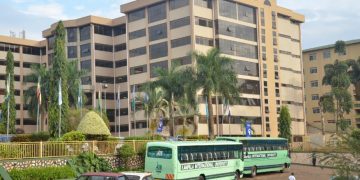Makerere University has received an extended grant worth US$4.5 million from the Swedish government (Sida) to support ongoing research and human resource development at higher education institutions in Uganda over the next two years.
Professor Barnabas Nawangwe, vice-chancellor of Makerere University, and Swedish Ambassador to Uganda Per Lindgärde signed an agreement that will cover the next two years, but also effectively facilitate the phasing out of a research capacity and institutional development programme dating back to 2000. With the two-year extension, the collaboration will now end on 30 June 2022.
The Swedish International Development Cooperation Agency (SIDA) has been an important source of funding for research development in Uganda under a bilateral research collaboration programme initiated in 2000.
Funding is channelled through Makerere University to five public Ugandan universities. In addition to Makerere, they include Kyambogo University, Busitema University, Gulu University, and Mbarara University of Science and Technology.
Ambassador Lindgärde said the extension will consolidate Uganda’s research capacity by 2022 and ensure the institutional preparedness of the five universities to continue to support research activities in Uganda after the extension period expires.
Consolidation
Professor Mukadasi Buyinza, head of the Directorate of Research and Graduate Training at Makerere, told Education News Uganda the extension will enable the consolidation of the research achievements within the project period and will create an exit strategy.
The grant will go towards the completion of 100 PhDs, and quality assurance for local PhD programmes (continued support to university-wide course activities for PhD training, supervision and mentorship training) in all five universities.
The additional funding will also be used to develop policies and implement guidelines that have an impact on postgraduate training and the research environment in Uganda. These include capacity building in the innovation ecosystem, the development of intellectual property policy, quality assurance and academic integrity policy, as well as research supervision and mentorship polices.
While the precise nature of the cooperation between Uganda and SIDA has changed in form and volume since it kicked off in 2000, the focus at Makerere has consistently been on research and researcher training, according to Buyinza. Strong links have been established and maintained with Swedish universities in PhD sandwich programmes and joint research.
The bilateral research programme has seen the Swedish government invest more than US$100 million into institutional building, scientific research and human resource development in five public universities.
Ambassador Lindgärde said the support has been successful in developing capacity at both the institutional and individual level, with 750 students being trained since the beginning.
Sustainability
The phased withdrawal of Swedish support from the programme highlights the need for sustainability in national research funding.
Buyinza said while the SIDA project has produced invaluable knowledge which will be used to inform policy, development and decision-making, it is generally recognised that donor financing does “not form a good basis for the maintenance of the quality of research capacity in the long term”.
While about 80% of the postgraduate training and research in Uganda is currently funded by external donors (according to the latest report from the National Council for Higher Education), experts have long argued that funding higher education and research cannot be left only to foreign donors and this message has reached the Ugandan government which has set aside, for the second year running, funding to support high-impact research and innovation that informs national development priorities.
For the financial year 2020-21, a total amount of UGX30 billion (US$8 million, the same as the amount disbursed in 2019-20) has been set aside to support high-impact research and innovation.
Ambassador Lindgärde said his government believed that funding of research should be “steered nationally”.
“In order to strengthen Uganda’s ownership of the research agenda we would like to ensure that our partnership creates and builds a sustainable system for postgraduate training and research in Uganda. This requires stronger government commitments to provide the necessary resource to this sub-sector,” he said.










Discussion about this post